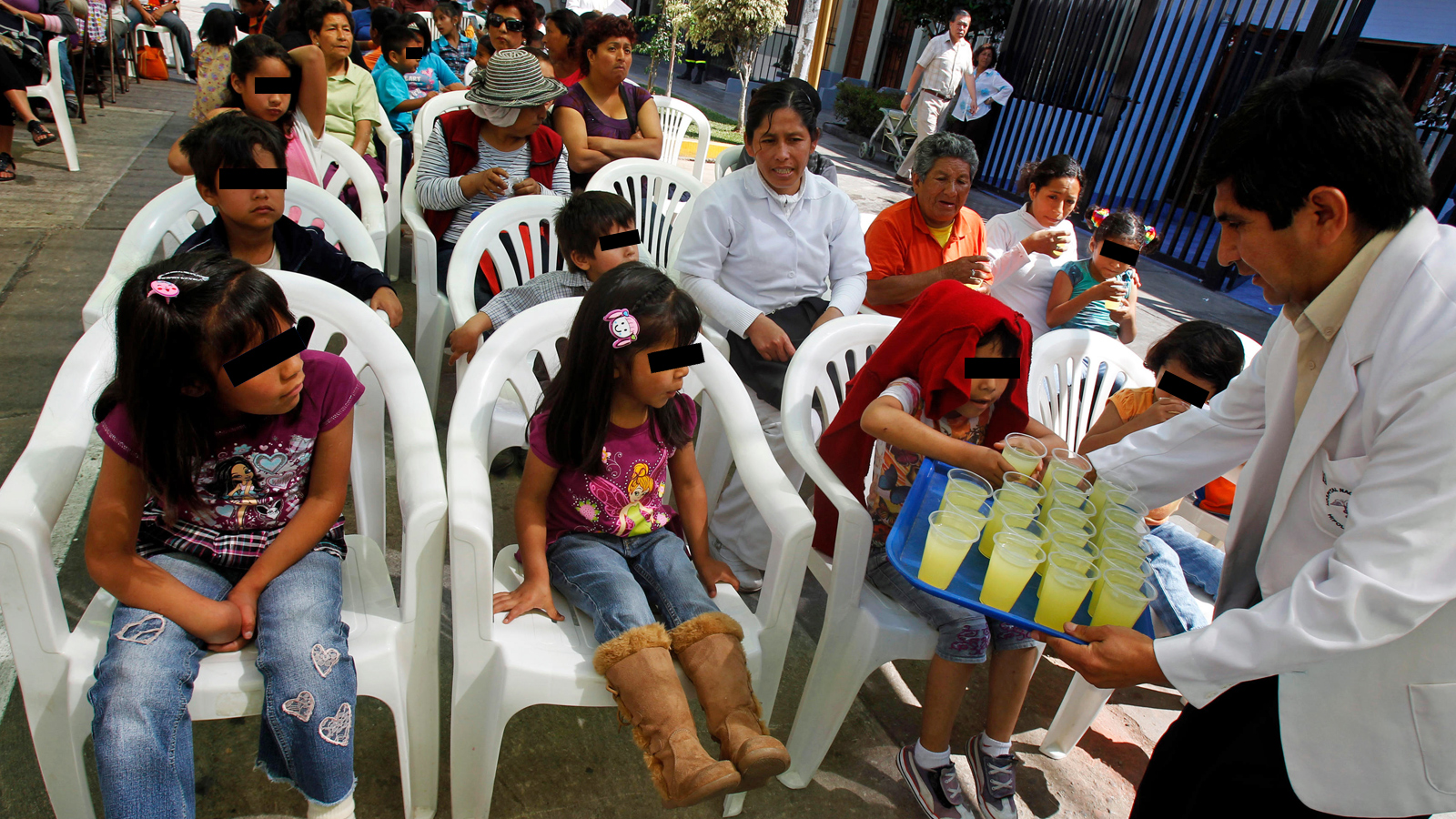POSTED ON
October 20, 2016 BY Scott Doggett
Helping HIV/AIDS Kids Fight Infections

2
 1879
1879  0
0 
The government of Peru freely dispenses HIV drugs to Peruvian children infected with the AIDS virus, which is good, but it doesn't provide the kids with healthy food or a healthy environment or help anyone who helps the kids in those ways, which is shameful. It's why the Hogar de Vida—Home of Life, a shelter for HIV-infected children in Lima—exists.
Without a healthy diet and housing that's conducive to good health, the kids won't receive the full benefits of their medication. It's like this: People with healthy immune systems can be exposed to certain viruses and have no reaction to them, but people living with HIV face serious threats from opportunistic infections caused by the viruses. The infections are called "opportunistic" because they take advantage of a weakened immune system, which is what a person can expect from malnutrition and/or unheated housing.
As best it can, the Home of Life provides 20 HIV-infected moms and 43 HIV-infected children, who had been living in extreme poverty, with a well-balanced diet and healthy living conditions so that the meds they are taking can be as effective as possible.
Government health workers brought the infected people to the shelter—a house in a modest neighborhood—but aside from donating some milk and water, the government does nothing to help, director Gladys Leguía Puente told me, speaking through a translator.
To cover its costs, the shelter sells chicken-and-potato meals bi-monthly festivals and hosts events such as amateurish-but-popular fashion shows, most of which are attended by people who pay a modest entry fee chiefly to help the shelter's residents.
In addition to feeding and housing the children, the shelter sends them to school as soon as they are old enough to attend (when I visited, the kids ranged in age from 4 months to 18 years).
Raising funds to feed, house and school the children is hard enough, Gladys said, but a profound lack of education about HIV/AIDS makes life all the more difficult for people devoted to helping the infected.
For example, schools in Peru usually won't enroll HIV-infected children. It's not only that the parents of healthy kids would protest, but teachers would as well. The children at the shelter are able to attend a school because Gladys is friends with its principal, who keeps the kids’ illness a secret from other school personnel.
Even health workers fear the infected children. Most nurses won't touch them, Gladys said. If an HIV-infected child needs to be examined or receive an injection or have blood drawn, only the few nurses who have received special training will tend to the kids.
I asked what I could do to help. With her bilingual nephew translating, the director said the Hogar de Vida could really use some beef and chicken. And with that, I proposed that Gladys, my wife Susan, the nephew and I go shopping. Unfortunately, the nephew was unable to go.
Twenty minutes later, a taxi took Gladys, Susan and me to a market, where Gladys picked out a small shopping cart and made her way to the meat section. There, she put just enough beef and chicken in the shopping cart to feed 7-10 people once. I politely asked her if I could borrow her phone, and I called the boutique hotel where my wife and I were staying.
A friendly receptionist answered and I explained the situation: I wanted to buy a lot of meat for a shelter for HIV-infected people and I was in a market with the shelter's director, but she was shopping in small quantities. Could he please explain to her that I wanted to buy as much meat as the shelter's freezers could accommodate. I handed the phone back to the director and a minute later I was speaking with the hotel receptionist again.
"She's very shy and doesn't know how much meat you're willing to buy," the receptionist said. "She sounds very humble." Hmm. Then he said that the director had told him that the shelter had two enormous freezers, both donated and both nearly empty. That was what I needed to know.
Thirty minutes later we left the store with two taxis, one containing Gladys and my wife and the other me. And joining us and the taxi drivers were 60 beef steaks, 20 frozen chickens, a gallon of cooking oil, and a bunch of diapers. The cost of the groceries was a fraction of what I'd have paid in the U.S. and less than a third of my monthly rent for the 500-square-foot apartment in which Susan and I live.
It was the deal of the century, I thought, and judging from the excited kitchen staff when we returned to the shelter the groceries were greatly appreciated. The cook, an older woman as thin as a twig, bear-hugged me several times. The experience filled me with joy and is perhaps my fondest memory of Peru.
As for the freezers, they were a sad sight. While Gladys and others brought the groceries inside, the cook opened the doors of two large white freezers. One was totally empty. The other contained one frozen chicken and maybe five pounds of ground beef, nothing else.
The cook had been doing what so many cooks in her position do: She'd been serving lots of rice and beans and tiny amounts of meat and chicken, the latter being so much more expensive than the former. At least for a little while she wouldn't have to be so frugal with sources of protein I eat so often with hardly a second thought.
(Postscript: To protect the identities of the children at Hogar de Vida, I didn’t take any photos of them. The Reuters photo above, taken years ago, shows children living with HIV/AIDS being served juice during a Christmas celebration in Lima.)
Without a healthy diet and housing that's conducive to good health, the kids won't receive the full benefits of their medication. It's like this: People with healthy immune systems can be exposed to certain viruses and have no reaction to them, but people living with HIV face serious threats from opportunistic infections caused by the viruses. The infections are called "opportunistic" because they take advantage of a weakened immune system, which is what a person can expect from malnutrition and/or unheated housing.
As best it can, the Home of Life provides 20 HIV-infected moms and 43 HIV-infected children, who had been living in extreme poverty, with a well-balanced diet and healthy living conditions so that the meds they are taking can be as effective as possible.
Government health workers brought the infected people to the shelter—a house in a modest neighborhood—but aside from donating some milk and water, the government does nothing to help, director Gladys Leguía Puente told me, speaking through a translator.
To cover its costs, the shelter sells chicken-and-potato meals bi-monthly festivals and hosts events such as amateurish-but-popular fashion shows, most of which are attended by people who pay a modest entry fee chiefly to help the shelter's residents.
In addition to feeding and housing the children, the shelter sends them to school as soon as they are old enough to attend (when I visited, the kids ranged in age from 4 months to 18 years).
Raising funds to feed, house and school the children is hard enough, Gladys said, but a profound lack of education about HIV/AIDS makes life all the more difficult for people devoted to helping the infected.
For example, schools in Peru usually won't enroll HIV-infected children. It's not only that the parents of healthy kids would protest, but teachers would as well. The children at the shelter are able to attend a school because Gladys is friends with its principal, who keeps the kids’ illness a secret from other school personnel.
Even health workers fear the infected children. Most nurses won't touch them, Gladys said. If an HIV-infected child needs to be examined or receive an injection or have blood drawn, only the few nurses who have received special training will tend to the kids.
I asked what I could do to help. With her bilingual nephew translating, the director said the Hogar de Vida could really use some beef and chicken. And with that, I proposed that Gladys, my wife Susan, the nephew and I go shopping. Unfortunately, the nephew was unable to go.
Twenty minutes later, a taxi took Gladys, Susan and me to a market, where Gladys picked out a small shopping cart and made her way to the meat section. There, she put just enough beef and chicken in the shopping cart to feed 7-10 people once. I politely asked her if I could borrow her phone, and I called the boutique hotel where my wife and I were staying.
A friendly receptionist answered and I explained the situation: I wanted to buy a lot of meat for a shelter for HIV-infected people and I was in a market with the shelter's director, but she was shopping in small quantities. Could he please explain to her that I wanted to buy as much meat as the shelter's freezers could accommodate. I handed the phone back to the director and a minute later I was speaking with the hotel receptionist again.
"She's very shy and doesn't know how much meat you're willing to buy," the receptionist said. "She sounds very humble." Hmm. Then he said that the director had told him that the shelter had two enormous freezers, both donated and both nearly empty. That was what I needed to know.
Thirty minutes later we left the store with two taxis, one containing Gladys and my wife and the other me. And joining us and the taxi drivers were 60 beef steaks, 20 frozen chickens, a gallon of cooking oil, and a bunch of diapers. The cost of the groceries was a fraction of what I'd have paid in the U.S. and less than a third of my monthly rent for the 500-square-foot apartment in which Susan and I live.
It was the deal of the century, I thought, and judging from the excited kitchen staff when we returned to the shelter the groceries were greatly appreciated. The cook, an older woman as thin as a twig, bear-hugged me several times. The experience filled me with joy and is perhaps my fondest memory of Peru.
As for the freezers, they were a sad sight. While Gladys and others brought the groceries inside, the cook opened the doors of two large white freezers. One was totally empty. The other contained one frozen chicken and maybe five pounds of ground beef, nothing else.
The cook had been doing what so many cooks in her position do: She'd been serving lots of rice and beans and tiny amounts of meat and chicken, the latter being so much more expensive than the former. At least for a little while she wouldn't have to be so frugal with sources of protein I eat so often with hardly a second thought.
(Postscript: To protect the identities of the children at Hogar de Vida, I didn’t take any photos of them. The Reuters photo above, taken years ago, shows children living with HIV/AIDS being served juice during a Christmas celebration in Lima.)
By Scott Doggett, Reno, Nevada, U.S.A.
| Kindness Map |
|---|
| Kindness Partner's Information |
|---|
| Name | Hogar de Vida |
| Street Address | Jiron Ayacucho 571 - Magdalena |
| City | Lima |
| State/province | Lima |
| Country | Peru |
| Post Code | |
| Contact | Gladys Leguía Puente |
| Contact's Title | Director |
| Phone | 51 1 462-0763 |
| Website | http://www.hogardevidaperu.org/ |
| Source | Learned of the shelter from a hotel receptionist. |
| KiVi Notes |
|---|
| I learned about the shelter from the Percy Flores, a wonderfully helpful English-speaking hotel receptionist at the Atrium Miraflores Boutique Apart Hotel, Pasaje Tello 132, Lima, Peru. Phone is 51-1-255-7085, email is reservas@atriummiraflores.com, website is www.atriummiraflores.com |